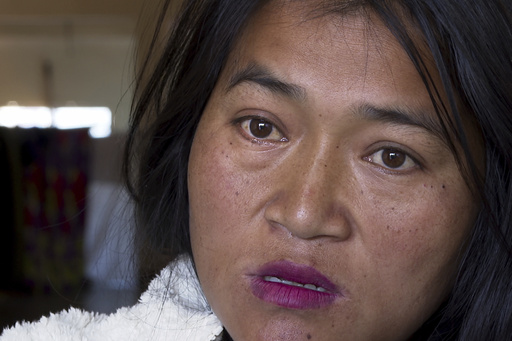KANGPOKPI, India — In the face of rising violence, Phalneivah Khonsai found herself fleeing her home with her husband and three children, taking only essentials and hoping to return soon. Their residence was set ablaze by a mob, prompting them to escape to the hills, joining thousands from their community in search of safety.
Now, nearly 19 months later, Khonsai, aged 35, finds herself still living in a government building adapted into a relief center, where conditions are dire, and privacy is limited. This relief center is located in Kangpokpi, roughly 50 kilometers from Imphal, the northeastern Indian state of Manipur’s capital, which has faced ethnic violence since last year. Within the gloomy and damp building, fabric dividers separate at least 75 families, all forced from their homes. “Living here is extremely challenging,” Khonsai remarked, as other women conducted their daily chores like washing clothes and dishes.
Ethnic clashes erupted in Manipur last year between the majority Meitei community and the minority Kuki-Zo tribes, resulting in over 250 fatalities and displacing at least 60,000 individuals. The state is now divided into two ethnic territories: one primarily occupied by the Meiteis and the other by the Kuki-Zo community. Each community has established armed factions that patrol roads to monitor for signs of their adversaries, with security forces establishing borders and buffer zones to separate the regions. Young people often spend nights guarding vulnerable villages against potential attacks.
As a Kuki, Khonsai expressed that the difficult living conditions in the relief center are impacting her family’s health. They feel it is unsafe to return home due to fears of extreme violence. “If we go back, they will kill us. There is no hope for going back,” she lamented. The Meiteis, a predominantly Hindu group, reside in the Imphal Valley and nearby areas, while the Kuki-Zos inhabit the hills. The violence erupted last year as the Meiteis sought government recognition as a Scheduled Tribe, which would afford them various benefits, including job quotas and land purchases in predominantly Meitei regions. The Kuki-Zo community opposed this, arguing that benefits should be reserved for tribes that are economically disadvantaged and less educated.
Tensions escalated, leading to violent protests, looting, and widespread destruction of homes, resulting in mass displacement. Recently, although hostilities had decreased, violence flared again in November, claiming 10 more lives at the hands of paramilitary forces. The Kuki-Zo community has suffered greatly and accuses the state Chief Minister N. Biren Singh of bias toward the Meiteis, demanding his resignation. They now seek federal rule and greater autonomy.
Singh, who is Meitei, has refuted the accusations, claiming that people from hill tribes are engaging in illegal drug activities to finance a conflict against the Hindu populace. His administration is part of Prime Minister Narendra Modi’s Hindu nationalist Bharatiya Janata Party. The crisis has, however, adversely affected both communities. While many Kuki-Zo displaced individuals have taken refuge in the hills, the Meiteis have sought safety in refugee centers within Imphal. Mistrust remains high, as members of each community feel unsafe in the other’s territory.
Yengsom Junksom Memi, a Meitei, was forced to abandon her home in Kangpokpi due to the violent attacks. She initially sought shelter at a police station before relocating to a relief center in Imphal, where she now lives with 600 other displaced Meiteis. She revealed that her home has been overtaken by attackers, stating, “Our future looks bleak. It’s challenging to secure even two meals a day.”
Ngamminlun Kipgen, spokesperson for the Committee on Tribal Unity, representing the Kuki community, criticized the federal government for its inability to quell the violence. “I believe the Prime Minister needs to take action,” Kipgen insisted. Opposition parties have been demanding Modi visit Manipur; however, he has not done so since the onset of violence but has tasked his home minister, Amit Shah, with addressing the situation.
Kipgen suggested that a division of Manipur into two separately administered regions, one for the Kukis and another for the Meiteis, could help restore peace. “It is essential to recognize that, for now, the Kukis and the Meiteis cannot coexist, and the state or central government should not push them to reconcile at such a critical moment,” Kipgen concluded.


